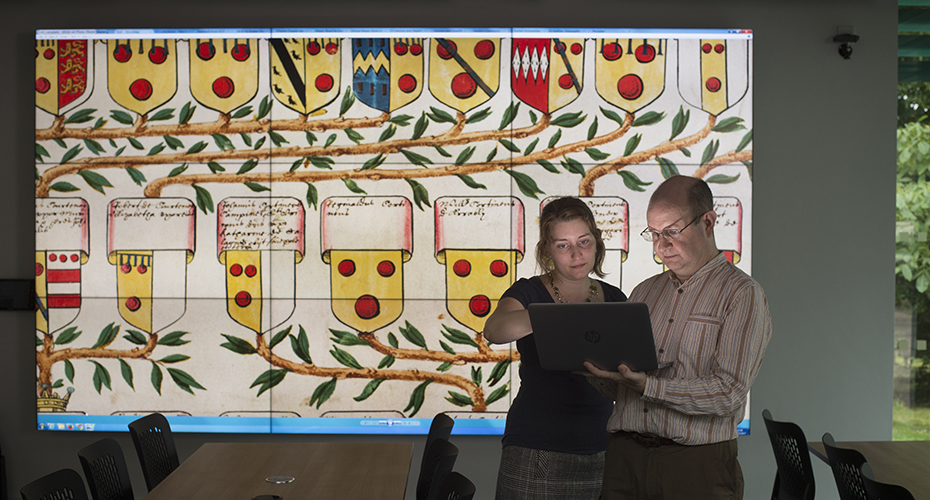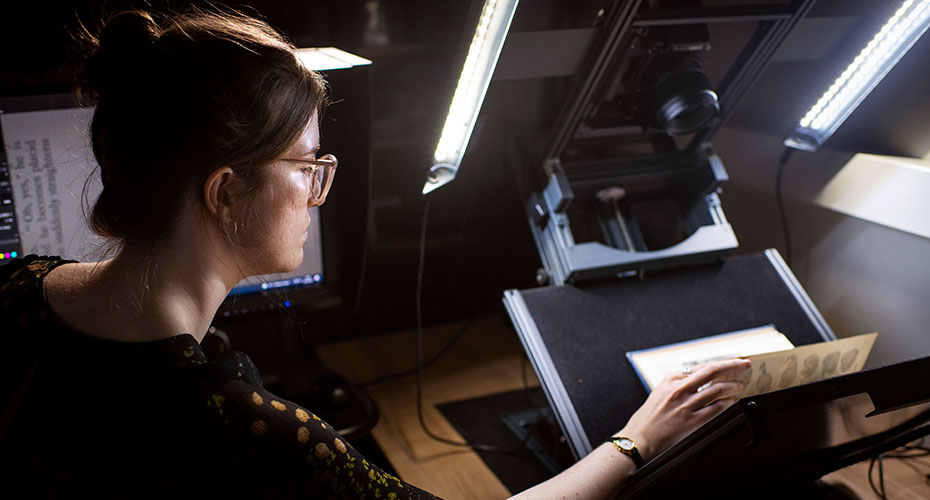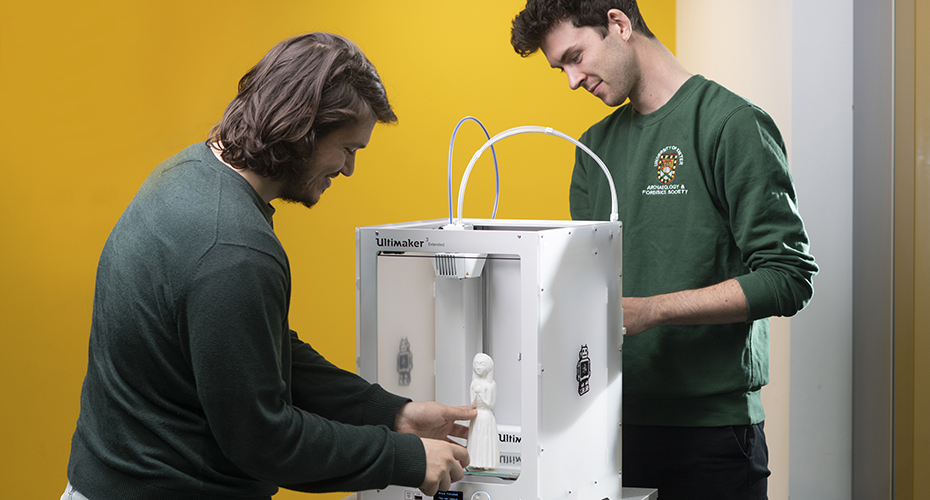What we offer
The Digital Humanities team offers specialist expertise to advance research and teaching through academic collaboration, training and research seminars, and sector-leading facilities for digital investigation and engagement. Our focus is on inspiring and empowering staff and students to use innovative technologies as digital scholars.
We work closely with researchers within the Faculty of Humanities, Arts and Social Sciences, but we are happy to discuss collaborations with all parts of the University and external partners where resources allow and with appropriate arrangements.
Please get in touch to discuss working with us.
For researchers: |
For all staff and students: |
For module convenors and teachers: |
For students and recent graduates: |
|
Collaboration on projects and digital resources |
Collaboration on Projects and Digital Resources
The Digital Humanities team is available to collaborate on research projects with digital elements, from offering one-off support to helping shape the academic goals on the level of CI or PI. Our involvement varies depending on the needs of the project, but previous projects have included photographing archival collections, partnering with research teams to encode and publish complex literary and historical texts, and creating online platforms to exhibit digitised materials.
Please get in touch as early as possible while planning your project so we can discuss how we can provide the most effective support (recommended minimum of six weeks before internal submission).
Grant application development and DMP support
The Digital Humanities team offers advice and support for funding applications for research projects with digital components. Support can range from assistance with writing a Data Management Plan (DMP), to a member of the DH team collaborating as a Co-Investigator on the project (see above).
Please get in touch as early as possible in your bid planning process to discuss your project and how we can help (recommended minimum of six weeks before internal submission).
For more general guidance, we also run workshops in funding application skills, such as writing Data Management Plans, as part of our termly training programme.
Website Development and Hosting
For projects looking to publicise and share research online, we can help to develop and host websites. We have various frameworks available that can be adapted to the needs of each project, from Wordpress websites and blogs which project teams can edit themselves, to more complex databases and bespoke sites for presenting collections of texts and images online.
We are not always able to help with every website request due to the long-term commitments of hosting and maintenance, but we are very happy to discuss all requests.
In some cases we can also migrate externally designed or hosted websites to University of Exeter servers. This is highly dependent on the website, so please contact us to discuss this possibility.
Digital skills training
We run a regular programme of workshops for staff and students, covering data management and grant application as well as hands-on digitisation methods such as photography and photogrammetry. These usually take place during the autumn and spring terms, but one-off events may be available outside these times. See our training page for more information on what we offer, and our upcoming events calendar.
We can provide basic training for people borrowing equipment or using the Lab facilities, and we may be able to offer tailored training sessions for specific projects.
Students interested in gaining digitisation experience might benefit from our internship programme or volunteer scheme.
Have a look at our Libguide for introductory information and reading about the methods we use.
Digitisation services
We offer a range of digitisation services, including document and manuscript photography, photogrammetry, 3D printing, RTI, and digitisation of older media formats such as VHS and reel-to-reel tapes. Read more about the kinds of digitisation we do in the Lab.
Digitisation is usually carried out onsite in the Lab, although in some cases it may be possible for members of the team to travel to digitise materials that cannot be brought to campus. We consider each digitisation project individually, so please get in touch to discuss what we can do for you.
If you would like to do your own digitisation, see the Equipment and Facilities section below.
Equipment and facilities
Many of our lab spaces can be booked for use, and we have a range of cameras, audio recorders and other equipment that can be loaned for use off campus. Find out more about what we can provide and how it works.
Teaching Facilities
Our digitisation spaces provide excellent facilities for taught modules as well as workshops and other events. Previously we have supported teaching by offering tours of our labs and space for specialist activities such as 3D printing, video games and cyanotype development. Please get in touch to discuss using our facilities in your teaching.
Digitisation and skills training for modules
Our digitisation services are available to enhance teaching by providing accessible digital versions of physical materials. In the past, this has included capturing high resolution photography of manuscripts, setting up skeleton websites for students to experiment with digital curation, and creating photogrammetry models of archaeological finds to make them more accessible. As our digitisation capacity is limited, we may not be able to help with every request, but please get in touch to discuss what we can provide.
We can also provide skills training and digitisation experiences that can be incorporated into relevant teaching courses. These often include photography workshops and basic text encoding training, but we are happy to discuss other possibilities.
SCP Internships
Each academic year, we offer part-time paid internships to six or more undergraduate interns, who carry out digitisation work and support the running of the lab. Find out more about what these internships involve and how to apply. These roles are part of the Student Campus Partnership scheme; see the SCP information page to find out more about how they work.
Volunteering
We provide flexible, part-time volunteering opportunities for those interested in gaining experience in a less formal way than through our internship scheme. Volunteers can work on projects, support the lab, and learn a wide variety of digital and practical skills. Get in touch to discuss what we can offer you.
GBP Technical Assistant Role
The Digital Humanities technical assistant role is a full-time, fixed term position available to recent graduates. The technical assistant plays an important role in digitisation projects and the day-to-day running of the lab, and the position is an excellent opportunity to develop digital skills.
This role is usually advertised during the summer, keep an eye on our social media for recruitment information. This role is part of the Graduate Business Partnership scheme; see the GBP information page to find out more about how they work.




.png)